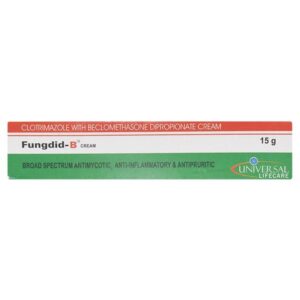CLOTRIMAZOLE + BECLOMETHASONE DIPROPIONATE
Clotrimazole: Clotrimazole is an antifungal medication used to treat various fungal infections, such as ringworm, athlete’s foot, and vaginal yeast infections. It belongs to the class of medications called azoles.
The mechanism of action of clotrimazole involves inhibiting the growth of fungi by interfering with the production of ergosterol, a vital component of the fungal cell membrane. This disruption weakens the cell membrane, leading to its death.
The recommended dose and duration of clotrimazole depend on the specific condition being treated. For example, for vaginal yeast infections, clotrimazole is available as a cream, tablet, or suppository. A typical dose is a single 100 mg vaginal tablet or a 1-day treatment of cream inserted into the vagina. It is usually used at bedtime for 7 to 14 days. However, it is essential to follow the instructions provided by a healthcare professional or the product label.
Common side effects of clotrimazole include itching, burning, irritation, redness, or swelling at the site of application. These side effects are generally mild and go away on their own. If these side effects persist or become severe, it is advisable to consult a healthcare professional.
In rare cases, clotrimazole can cause an allergic reaction, characterized by hives, difficulty breathing, or swelling of the face, lips, tongue, or throat. If any of these severe allergic reactions occur, immediate medical attention should be sought.
It is important to note that clotrimazole may interact with certain medications, so it is crucial to inform a healthcare professional about all the drugs and supplements being taken before using clotrimazole.
Overall, clotrimazole is a widely used antifungal medication that effectively treats various fungal infections. However, it is essential to use it as directed and seek medical advice if severe side effects or allergic reactions occur.
Beclomethasone Dipropionate: Beclomethasone Dipropionate is a corticosteroid medication used primarily for treating asthma and other respiratory conditions. It belongs to a class of drugs called glucocorticoids, which work by reducing inflammation in the airways and relieving symptoms such as wheezing, shortness of breath, and coughing.
The medication is available in various forms, including an inhaler for direct delivery to the lungs. When used as an inhaler, Beclomethasone Dipropionate helps to prevent asthma attacks by reducing and controlling the inflammation that narrows the airways.
The recommended dose of Beclomethasone Dipropionate varies depending on the severity and individual response to treatment. The typical starting dose for adults is 40-80 micrograms, twice daily. However, the dosage may be adjusted by a healthcare professional based on the patient’s condition.
As with any medication, there are possible side effects associated with Beclomethasone Dipropionate. Common side effects may include sore throat, hoarseness, coughing, or dry mouth. These symptoms are usually mild and transient. However, if these side effects persist or worsen, it is important to consult a healthcare professional.
Rare but potentially severe side effects may include allergic reactions, difficulty breathing, chest pain, or signs of an adrenal crisis (such as weakness, fatigue, or low blood pressure). If any of these symptoms occur, immediate medical attention should be sought.
It is important to follow the prescribed dosage and directions for use of Beclomethasone Dipropionate and to consult a healthcare professional if there are any concerns or questions about its use or potential side effects.

